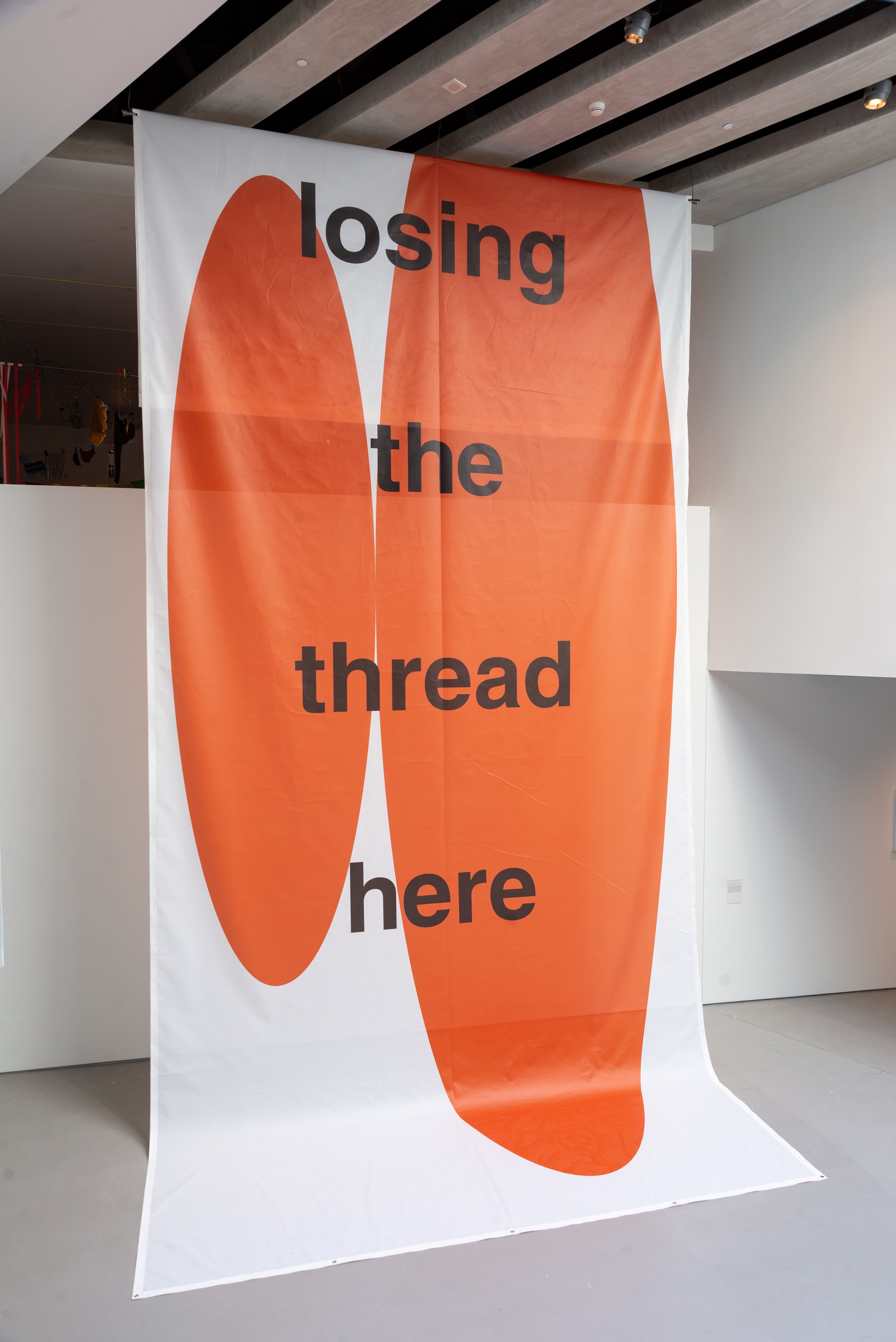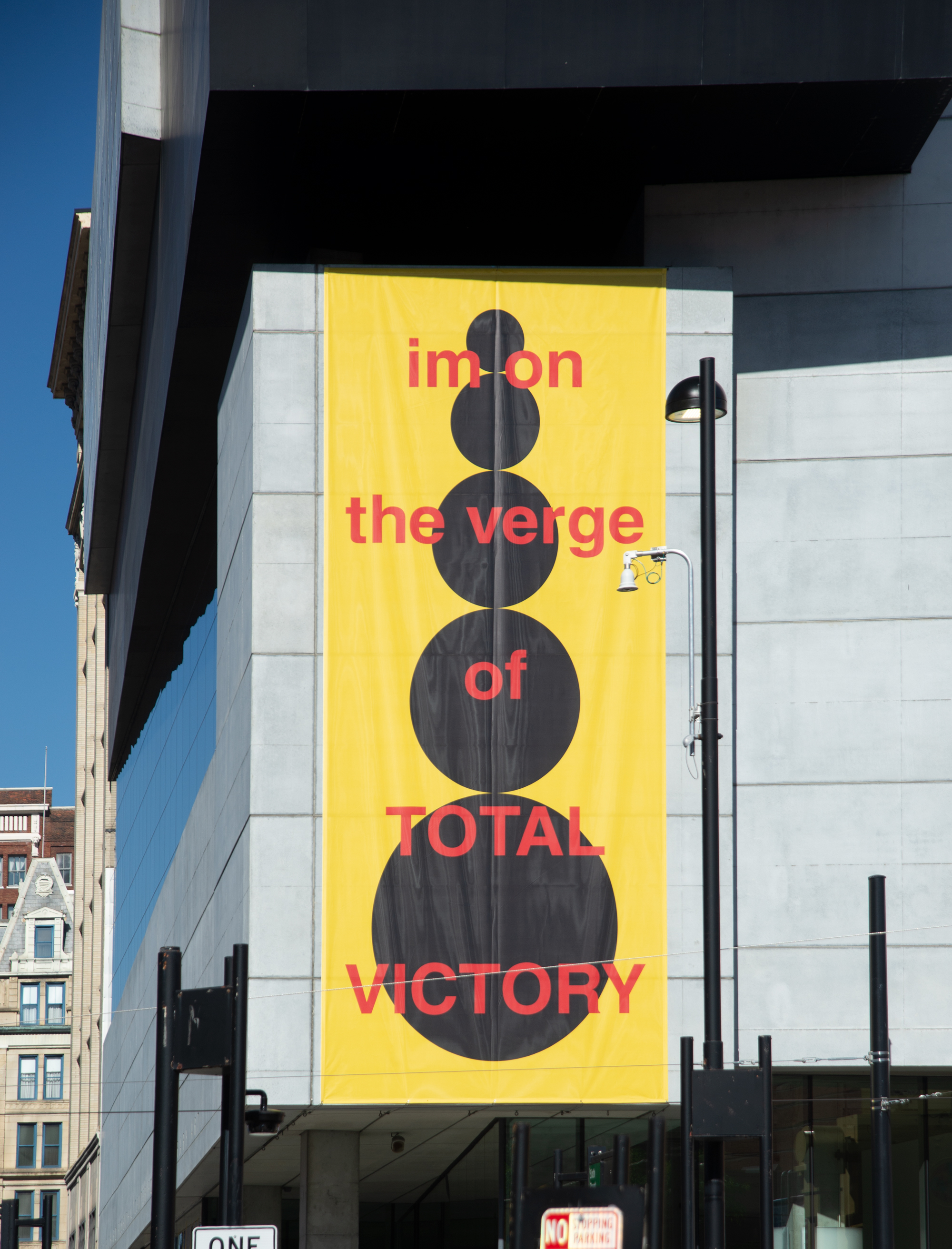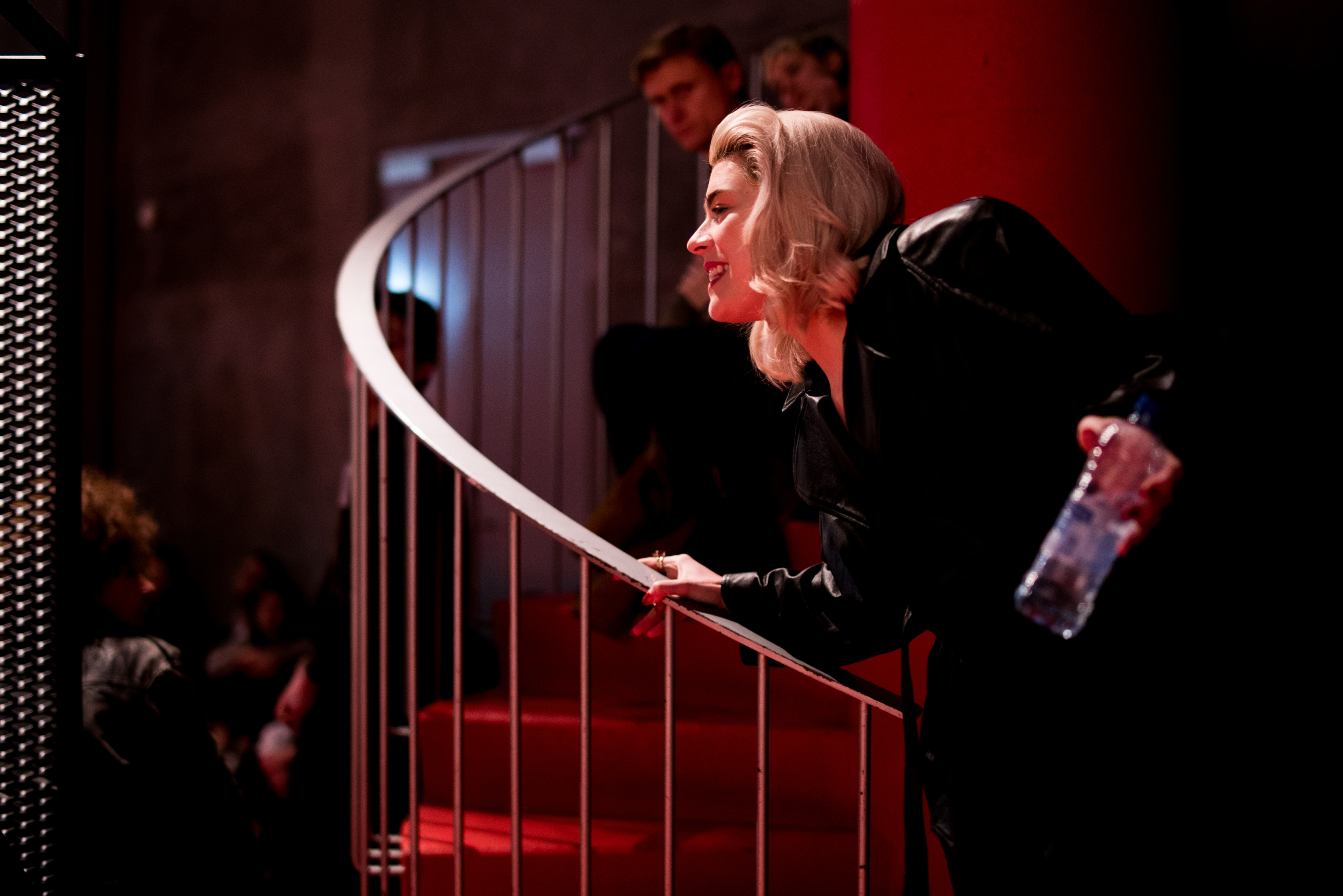Ana Janevski: The winter cover of Flash Art depicts you seated in leather pants, sleeveless shirt, high heels, with a mask, and with your head in your hands. The photo was taken during your performance “wow this huge wooden horse is great!” within the festival MOVE at the Centre Pompidou in Paris, fall 2020. You are seated on your performance structure and the audience is visible as well. I found this image powerful, as we all spent this last year with our heads in our hands, and it’s so telling about the power(lessness) of performance during this pandemic time. How has performance changed for you over the last year? What was your experience performing with the mask?
Nora Turato: I’m a bit split about that performance. Things got awkward ’cause of all the safety measures I imposed, voluntarily. In retrospect, maybe foolishly, I put on a mask, kept the gallery as empty as possible, and created dozens of performance slots. I wanted to do the right thing and I wanted it too much. That was naive of me. Performing in a mask in a cold, empty museum gallery with a dramatic echo is like stabbing yourself in the foot while trying to run a marathon. Doing that over and over was a bit self-destructive.
As time passed, these performances made me think about my future as a performer, the craving of intimacy, of wanting to perform in smaller spaces with as few people as possible, of wanting to be a generous performer—one who respects and gives whatever there is to give to their audience in the moment, who doesn’t waste energy on the documentation or dissemination of the performance on Instagram, and is exclusively interested in creating something in front of and for the people within reach of their voice.
Ana: I like the idea of you as a shaman and critic of the Internet, yet in a previous conversation you told me that you feel closer to Trisha Brown’s Accumulation than to the Internet. I loved this idea even more. Could you elaborate?
Nora: Have you noticed all the companies these days trying to position themselves as tech companies? Like, Tesla is not an automobile company, it’s a tech company. Tech is so relevant today, it’s become a catch phrase or selling point for business… I’m speaking cynically, of course. People say that my work is about the “internet” and “data” and so on for precisely that reason: it sells.
I’ve always enjoyed hearing what strangers see and find gripping in my work. Outside the world of published criticism and press releases, in the context of a friendly drink, walk, or dinner, I almost always hear something else, a new and surprising reflection on my work. People see what they wanna see, they project so god damn much and I find that interesting. What do you see in this thing I made? What do you project onto it and what can I learn from your projections? We’re all throwing Rorschach drawings into each other’s faces and looking for a meaningful human connection. That’s all we do, simple as that.
Just for the fun of it, lemme share a little conspiracy theory of mine with you. I feel that these Internet takes can be employed to diminish my work in the most elegant way. I think there is a part of my work that’s much more important than me “ventriloquising the internet”… the part that is much closer to my love of Trisha Brown than it is to the World Wide Web. This part of my work is unplugged, it’s related to the body, the voice, and the space those two create. In a world where my work relies solely on the big almighty Internet, my work is perceived as lesser and as such it’s a gimmick, a farce.
Last time we talked, I said the Internet is just like the sewage system, it’s a great thing to have, but it’s not in any way defining to the concept of shitting. It’s the other way around. We’re still gonna shit regardless of whether there’s a system designed to collect it.
Ana: And what about the virtual world? We can’t really ignore it but I think we have to be careful how to use it. Have you been asked to perform online?
Nora: I have successfully avoided performing online so far so why mess it up now by doing a third-rate, Zoom-talking-head type of thing? I’m not against performing online, but I’m against performing online half-assed. I’m against helping someone fill up their program by removing all the pillars and sense in my work for 200 bucks and some exposure in return. I’m done trading in attention ’cause that sacrifices the attention I put into my work. The moment you stop seeking and trading in attention, you can more easily distinguish what really makes sense for you and your work.
I have this strange but super strong itch to get serious and do stuff well. Nobody has given me sufficient budget, time, and trust to cook up something good online. Nobody is ready to give what it takes to do it well so I’d rather pass.
I had this idea of doing a cameo performance in some famous cartoon, like The Simpsons. It could be a special episode where Lisa discovers performance art, gets all nerdy about it, and goes to MoMA to see me perform—a performance that takes place in a parallel universe. That would be one way of doing the “online” thing, but who’s gonna fund that? No one!
That aside, I’ve been thinking a lot about the future of the performance in physical space and what it means for me. For a few years, there has been this trend of art performances that continue for hours on end. The kind that are shown in big halls and are fluidly choreographed but possibly unchoreographed (no one knows!), where the performer holds no obligation towards the audience and the audience holds no obligation towards the performer. No strings attached, 4 hours long, and a few smoke machines. Everyone consumed these performances on their IG feeds as super slick, stylised images.
In some vulgar generalization (!), this type of performance really had its apotheosis at Capitol Hill. Here, once again, we had a bunch of people hanging out for hours in this giant institutional space with nothing to do but take selfies in Nancy’s office. Seeing the photos from the protest as it unfolded in real time on my Twitter feed really made me think how this night was possibly the end of an era.

Ana: Talking about performance in real life: when I saw you perform for the first time I was impressed by your voice, by the different ways you can use it. It felt like your primary tool, full of potential. Recently, you have been working on your voice. What did you discover?
Nora: That so much is possible, that the cells in my throat are the only limitation to the potential of my voice, and that these cells are so adaptable. Bless evolution, diaphragm, muscle memory, and so on. I started working with Julie Adams two times a week a couple of months ago and I’m totally enchanted and inspired by her work. She is a go-to dialect coach in Hollywood and has probably worked on a bunch of stuff you know of—that inspiring scene, dialogue, or monologue you watched in cinema as a kid… Well Julie might have been there, backstage, making sure the flow and delivery of the words were all on the pulse. Basically, I’m working on my voice and delivery with someone who’s been working at the source of my formation of the English language: cinema.
It’s hard to explain what we do, sometimes we focus on phonetics, sometimes breath, proprioception, alignment, phrasing, sometimes it’s quacky and vague. It’s very much like taking my tongue to the gym. We are taking a hard look at words as sounds on such a studious level; it has really opened some cognitive floodgates for me. I’m starting to feel like I could be a dancer after all, it’s just that I dance with words. I’m so excited.
Ana: Performance, or your voice, your presence, are still important structures of your practice. How do you feel about producing work without performance?
Nora: I feel like I’m getting ready for the Olympics! I’ve been getting ready for my performance at MoMA for three years already. At some point I decided to take this moment of silence as an opportunity to go somewhere else, to train and read, get detailed, articulate, and sharp—to really make use of the time I’d lose anyway. I’m working on my performance harder than I ever imagined was possible.
The funny thing about being an artist that has always bugged me is that we’re seen as occupational tourists. People always ask me how I memorise my scripts, how I do this or that, and I just get so fuckin’ sad ’cause I know for a fact that a professional actor would never be asked such thing. I’m not saying I wanna be Shakespeare but I really do not wish to be a mere tourist. I have spent a year and a half working on the control of my voice, body, and breath, refining my very own idiolect and the idiolects of people around me, mimicking an effect pedal or a parrot—comfortable and effortless. I want to belt, twang, sound articulate or not, sound very “radio” or very “theater,” sound very much like my Yugo self, all on demand. I wanna discover what every muscle in my body is capable of and what sounds they can produce. This often comes down to proprioception, which involves training new neural pathways. In that sense, it’s very comparable to dance.
Effortlessness is such a big deal for me. It’s what we want from the people we watch perform. Whether they’re an actor, dancer, singer, or whoever, we want to trust them to do what they do well… We buy a ticket and place our trust in the performer. It’s a simple transaction. The moment that deal fails, we wanna run out of the venue and grab a drink. It breaks my heart to see people in the audience waiting for me to finish just so they can get a drink. I really wish to avoid that.

Ana: A year ago you were supposed to have a performance at MoMA and the pandemic pushed it to a further date. I am still very much looking forward to our collaboration. Do you have any New York dreams?
Nora: My vision of NYC is a conflation of Sonic Youth music videos, Sugar Kane, and Marc Jacobs. It’s Scorsese, Manolo Blahniks, an episode of Ally Mcbeal to the soundtrack of Nile Rodgers, and a coked-up Wall Street. It’s HBO and The New Yorker grabbing a cocktail at the Phillippe Starck hotel lobby circa 2004 before leaving to some stylish SoHo loft in a yellow cab with de Niro in the driver’s seat. NYC is this vast cultural construct and I’m not sure whether it died or never existed to begin with.
That said, my NYC dreams were formed in the mind of a teenage emo girl from a developing and war-torn country who makes lousy noise music, who is about to get accepted to art school and start watching The Sopranos a decade too late. So I guess my NYC dream would be getting profiled in The New Yorker or getting a late night show with HBO to replace John Oliver or something. Those are my dark, perverted, overtly pompous, and embarrassing dreams. There you go :)
Ana: Shall we keep talking about being intense—as we have this in common—being straightforward, not soft spoken, voicing opinions? I have often been told in a working environment that my sincerity is refreshing, which is interesting as I think that I am a socially intelligent person and if I had to be real sincere, it would be much worse haha…. There are moments I feel the so-called intense women will take all of the leadership positions and finally a “no bullshit” behaviour will be normalized. I guess those are moments of optimism. What do you think?
Nora: I think we both share a peculiar strain of something I like to call “immigrant grip.” I always expect things to go wrong and I strive to be ready for that at all times. We are also both single-child, straight-A good girls. We ask a lot of ourselves. Our parents raised us with this strange post-war trauma-induced optimism, we were taught to be ourselves but also not… we were girls after all. Being clear and straightforward is part of that subconscious combat plan of ours. This can be both a huge advantage and disadvantage. But if there’s one thing I’m sure of: I need to work and grind 10 times harder than most people. Don’t get me wrong, I have a cushion to fall onto but it’s a lousy, uncomfortable one.
Maybe I made this up, but I’m convinced that I can’t afford to beat around the bush. I will most definitely fall the very moment I lose my grip—lucky for me, I’ve got grotesquely long toes. I feel safest when I’m clear and true and when I have nothing to hide. Games and hiding waste my energy and time, and lack of energy and time makes me more likely to fall. That all culminates in me coming across as intense to well-cushioned people in the West.
If I knew I could stop being intense and still be OK, I would stop tomorrow!
The world can look a bit like The Emperor’s New Clothes at times, but I firmly believe that both of us can pretend. We can pretend well because we are kinda dark and cynical. Some people call this pretense social intelligence and I love that euphemism so much. We would not get this far without occasionally pretending, that’s for sure. I feel it’s important to say this and not craft some stupid plot about moral superiority.
Ana: You have two beloved dogs, Taco and Tuna, and they are a big part of your life. Have you ever thought of including them in a performance? Like Joan Jonas did.
Nora: Yes, I would love to include them but I can’t gauge whether they would like it or not. If I knew for a fact they would, I would do it immediately. I think Joan’s dog is better trained and possibly more flexible. These two spoiled children of mine are simply rootless when their comfort is in question. They get anxious when things are not 100% cosy. My dream is to emulate Joan Jonas more but my dogs won’t allow it. Taco joins in with howls and barks when I rehearse out loud; Tuna goes and hides in her pita the moment she hears me sing. She hates being bugged; everything is this terrible nuisance to her. She looks like she needs a nap constantly. Like mother, like daughter.
Julie said she was sure my dogs were called Daco and Duna before I met her (thanks to the slavic T), haha.
Ana: What have you been doing during the lockdown? Now that we have a year experience of the pandemic?
Nora: I exercised, decorated the apartment, watched movies, read books, scratched my balls, got existential, thought about things a lot, sold art online, discovered the concept of phone calls after dissolving into mush on Zoom. I actually started calling people on the phone, just like that. The other day I got tired of waiting for one curator to schedule a Zoom meeting with me so I called the reception of the institution she works at and asked them to connect me with her. She got on the phone, all confused, but we fixed everything very efficiently so it all worked out.
I’m part of the demographic that baked banana bread in the middle of a global health crisis. I didn’t bake a single banana but still that’s the category I found myself in and I feel beyond awkward telling you about it in public as if it’s a cool thing. All I can do is be sarcastic and self-aware about it, which is possibly manipulative or worse.
Ana: What have you been reading recently?
Nora: TBH, I’ve been listening more. I discovered this app called Otter, which lets me transcribe audio stuff. I started to analyse and transcribe and listen to a lot of stuff from movies, television, lectures, and so on. Julie introduced me to this concept of “shadowing” someone’s voice in order to study it. I read a lot of theory, and researched voice and speech methods that are used in Hollywood and in theater. I read so much on Reddit, ‘cause it’s so goddamn fun. Twitter filled in all the gaps.
The books I read during the pandemic that really stuck with me are Wayward Lives, Beautiful Experiments, My Lunches with Orson, and Second Hand Time. An eclectic bunch when I list them bluntly like this but each of them touched me in some major way, for different reasons. Of course, I did read a pile of unarticulated crap, things like Reed Hastings’ book and the memoirs of Mariah Carey and Matthew McConaughey. You wouldn’t believe how much irrelevant crap I read. When I dive into those rabbit-crap holes, I imagine the world as a puzzle that needs solving, a puzzle where every little thing could possibly add up to something sociopolitically poignant and that gets me so excited. Mad scientist vibes. The pandemic treated me with plenty of it.













